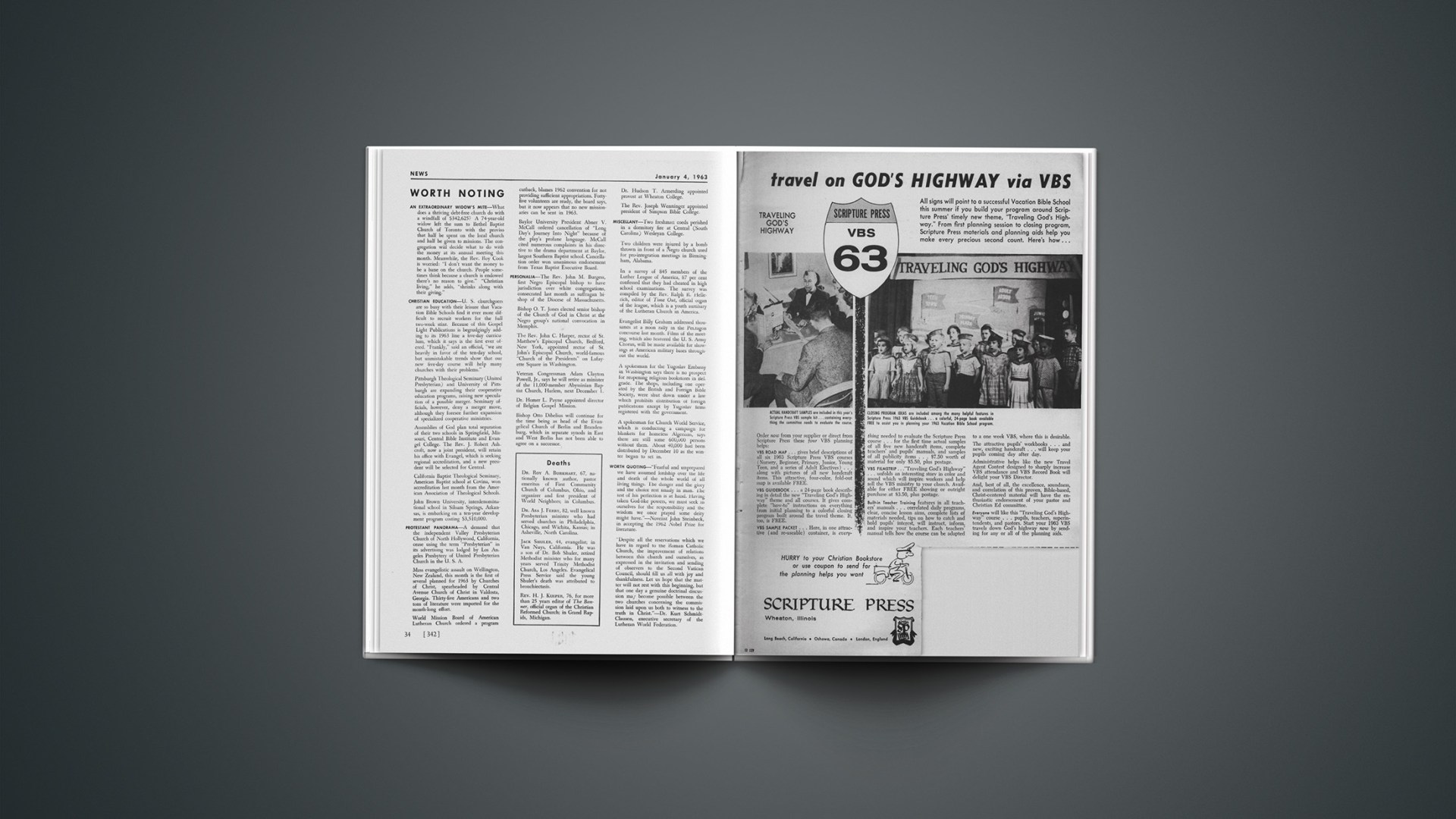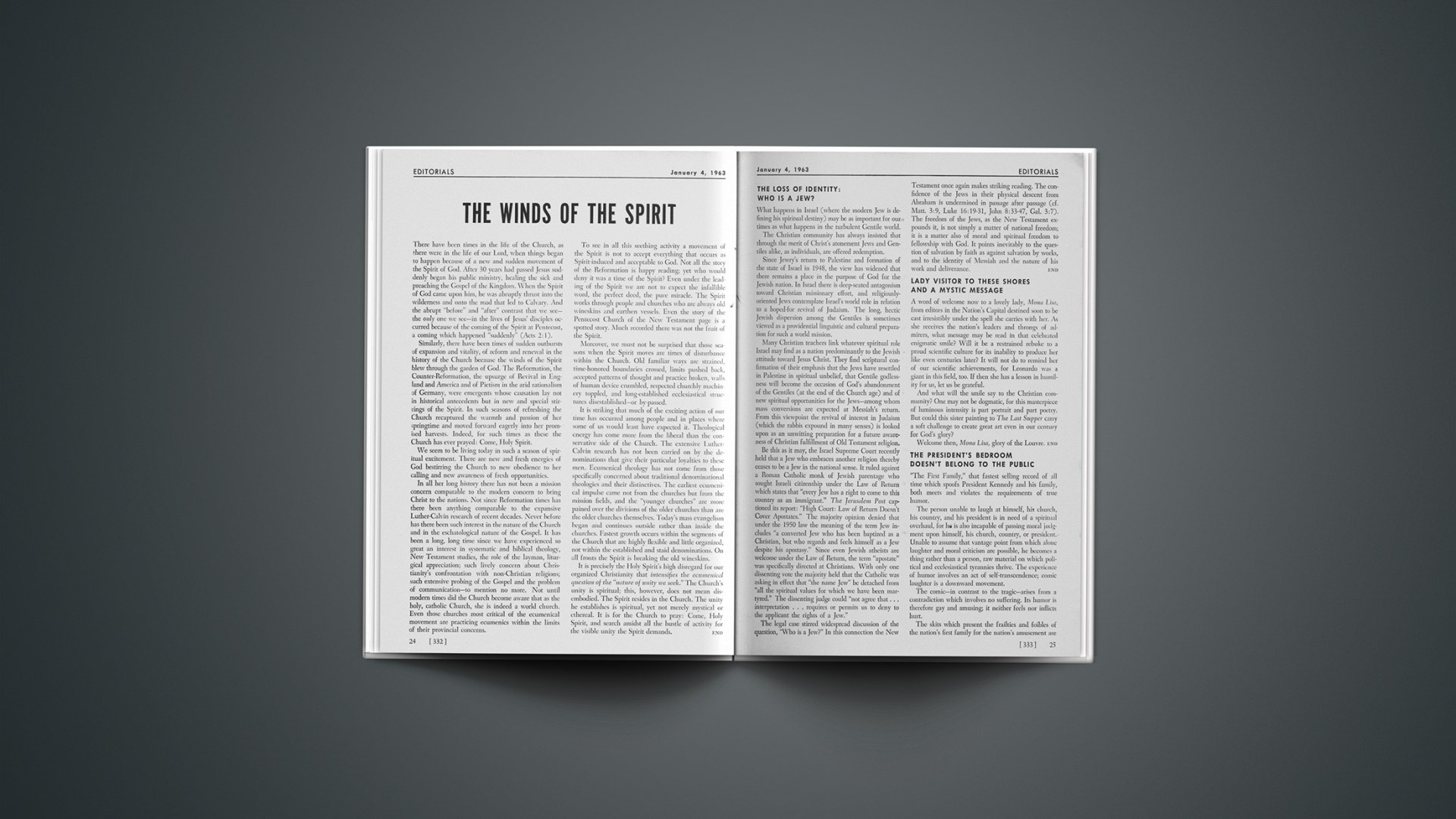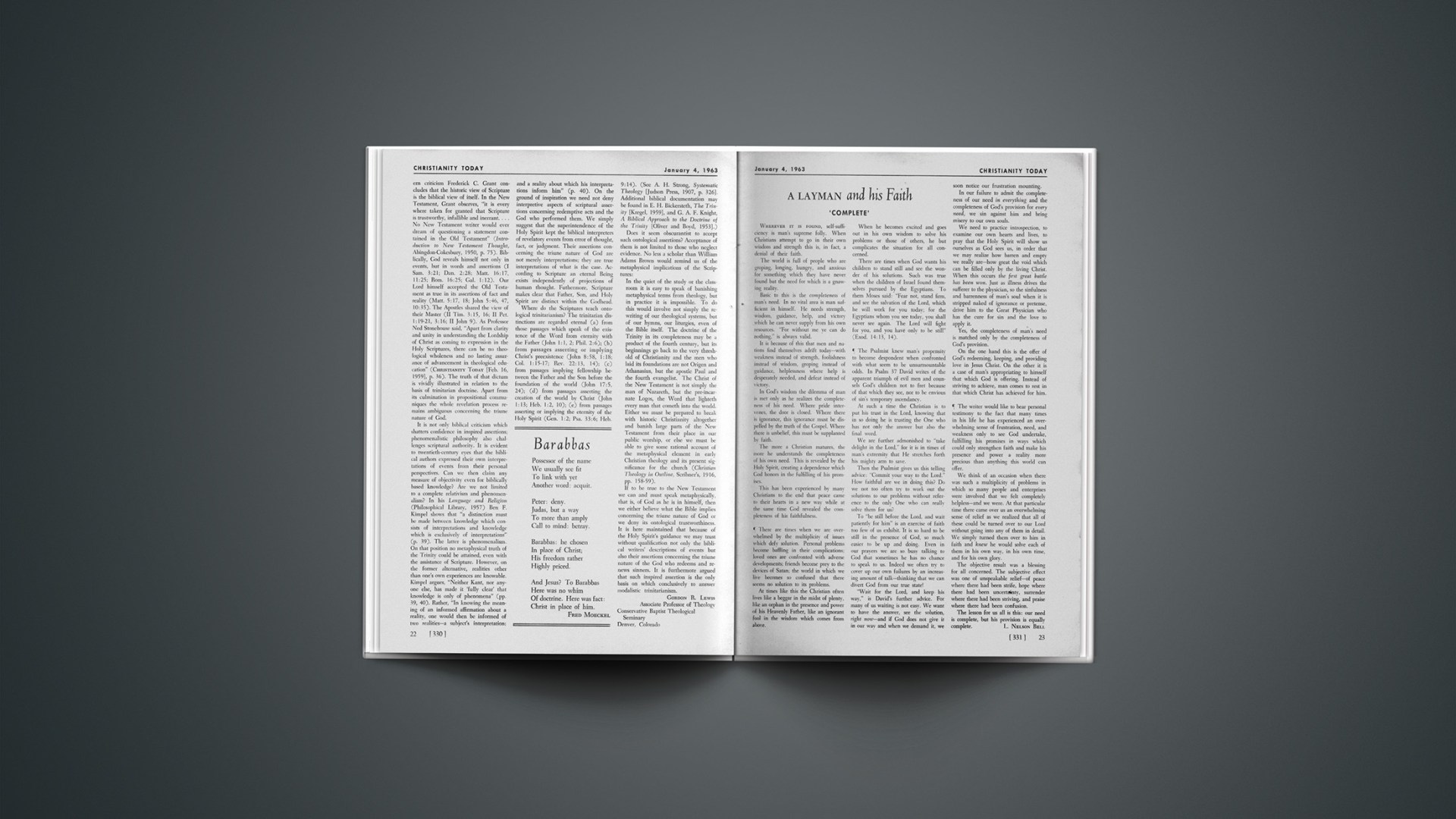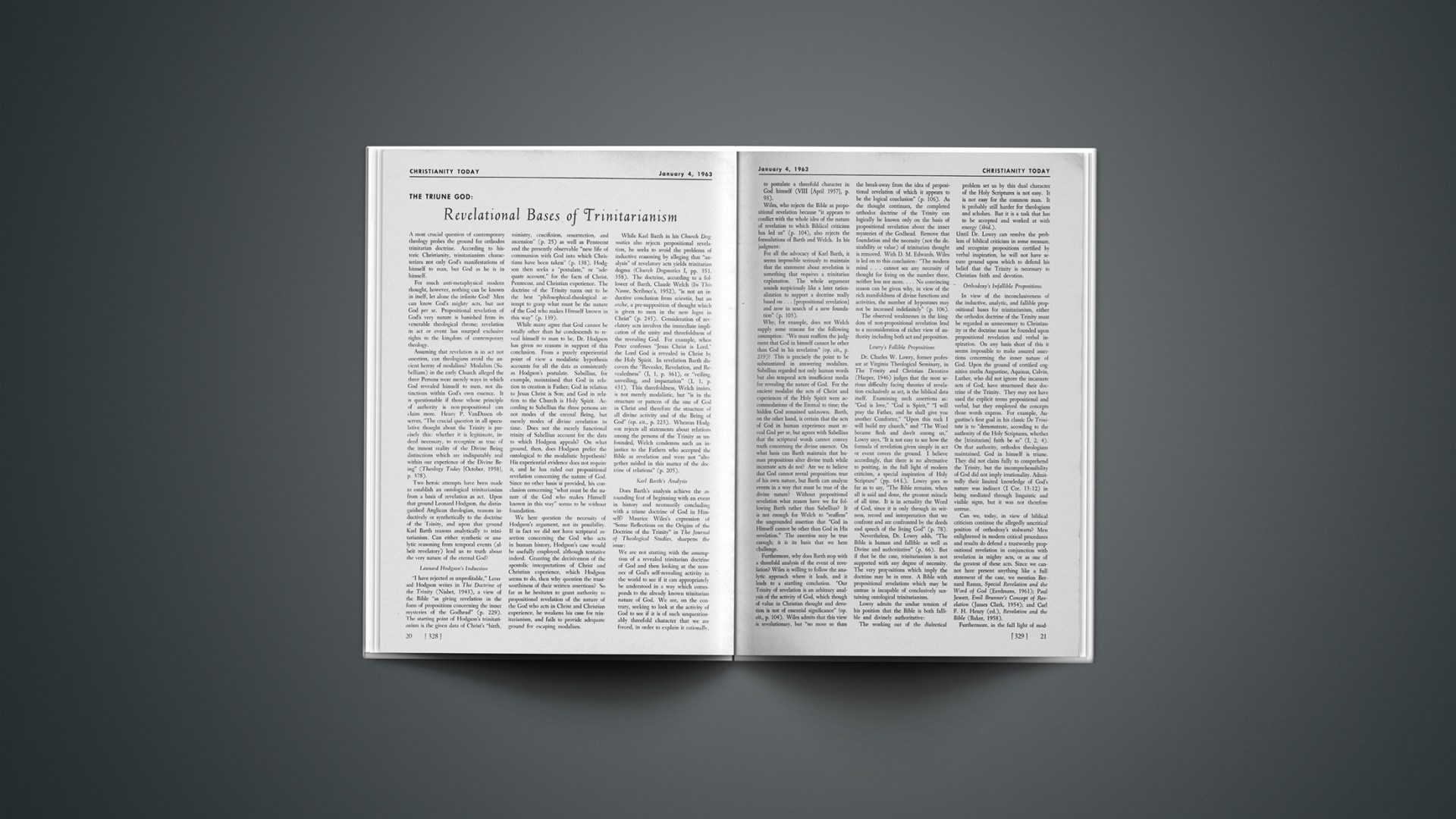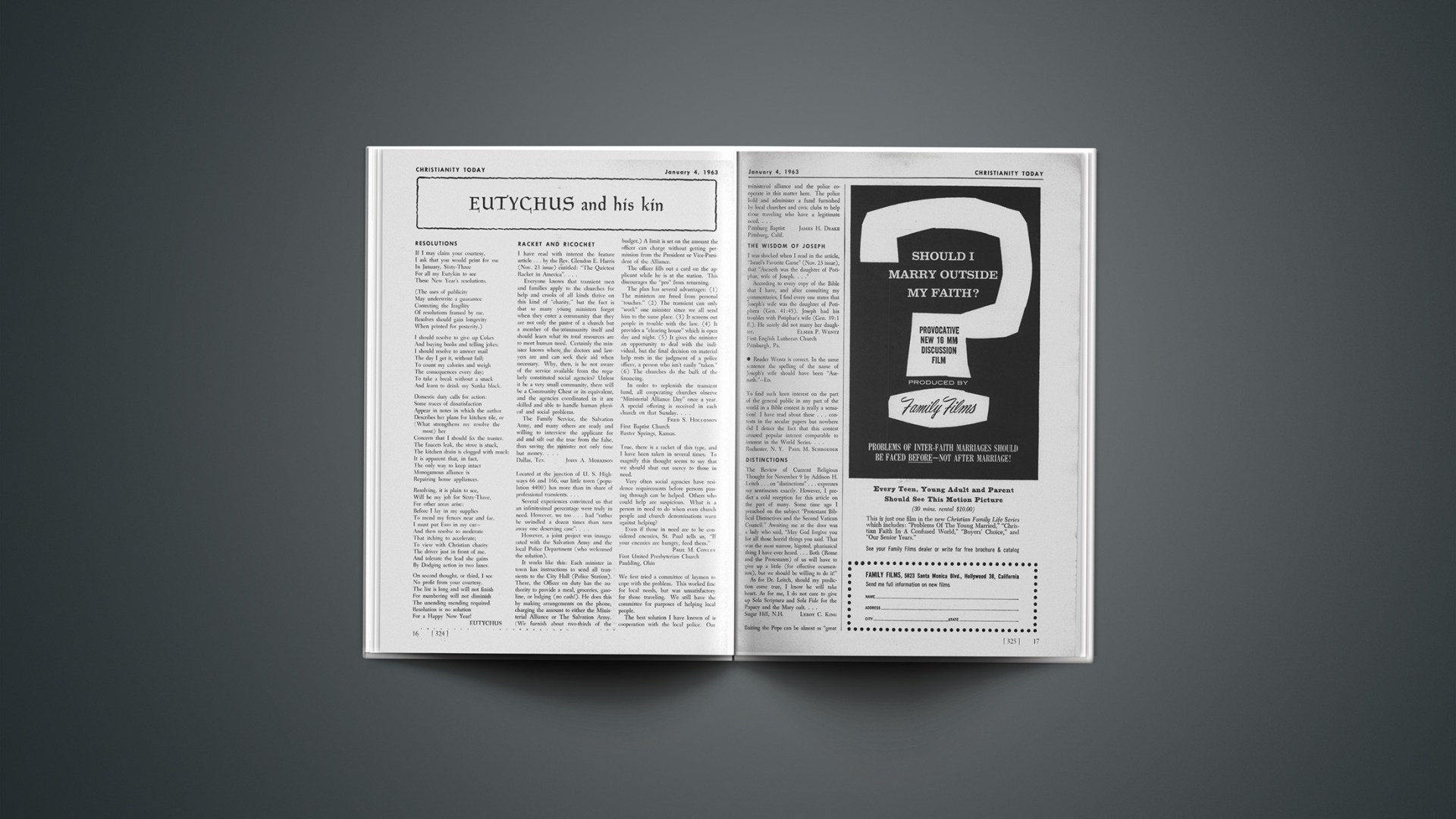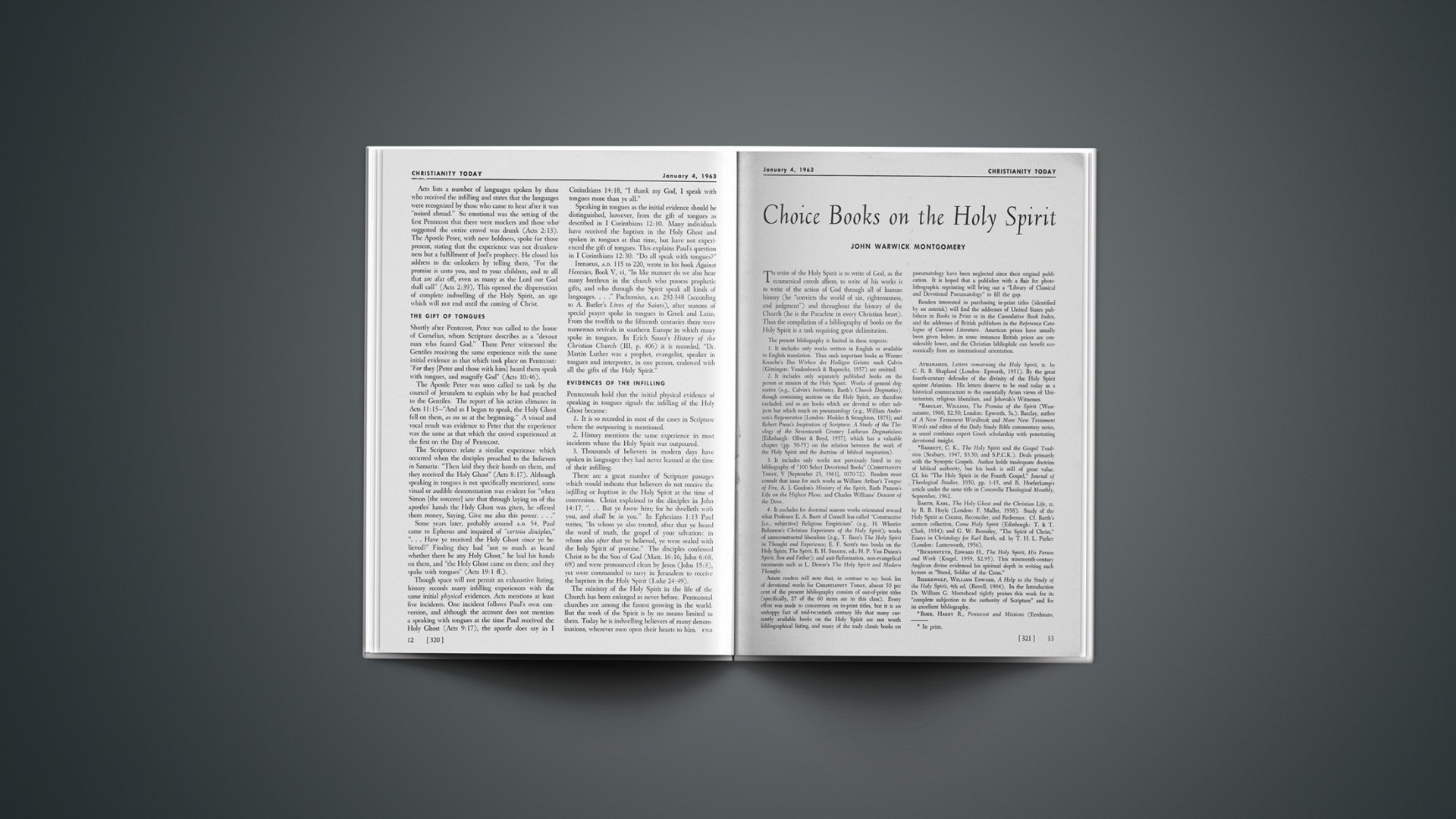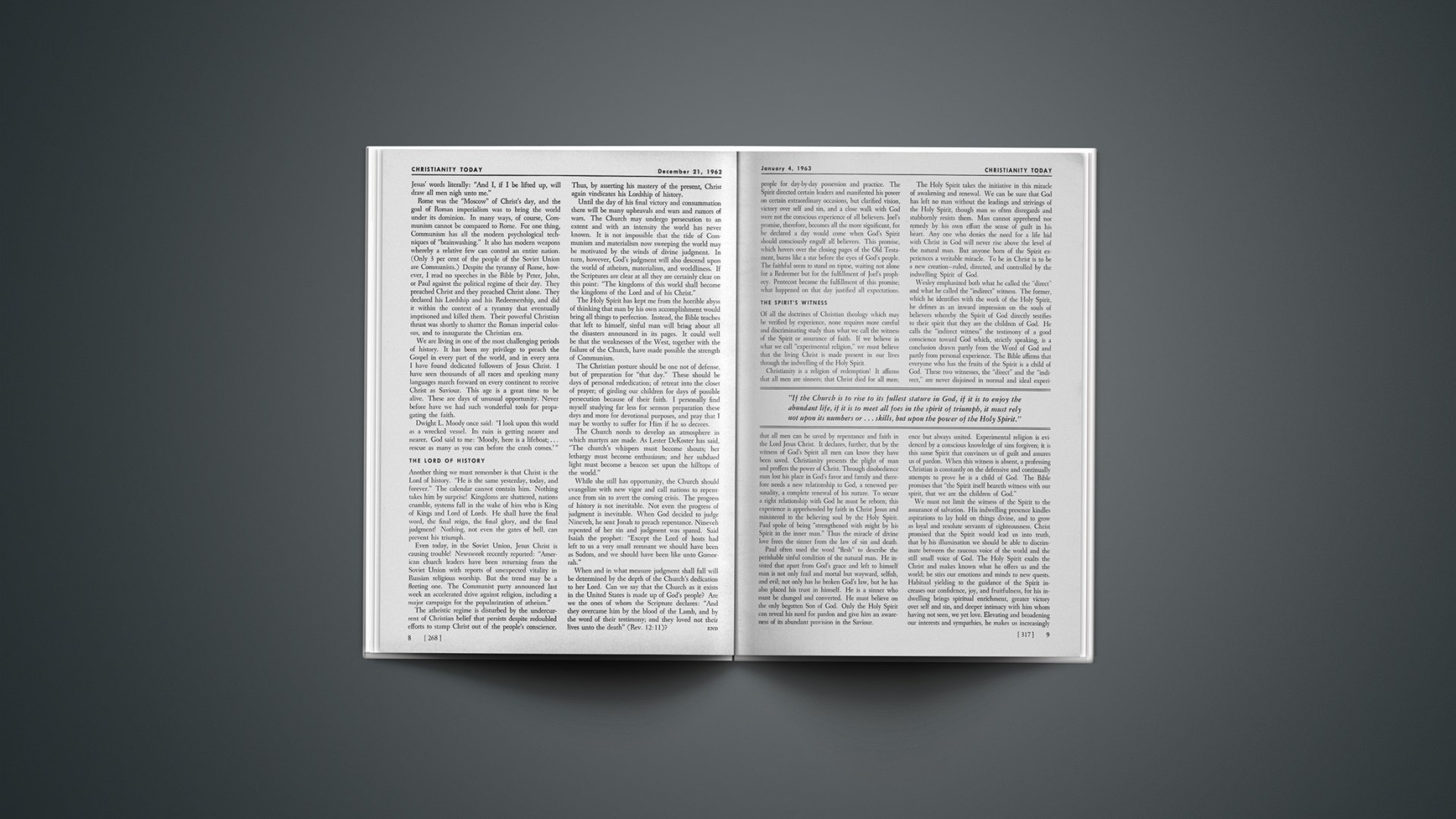A Theology That Walks The Earth
Evangelical Theology: An Introduction, by Karl Barth, translated by Grover Foley (Holt, Rinehart and Winston, 1963, 224 pp., $4), is reviewed by Geoffrey W. Bromiley, Professor of Church History and Historical Theology, Fuller Theological Seminary, Pasadena, California.
For his final lectures as professor of dogmatics at Basel, Karl Barth gave a special series of 17 addresses as an introduction to theology. (Subsequently he delivered the first five of these at Chicago and Princeton on his American tour, and he has contributed a special American foreword to the English translation of the whole work.)
In these lectures Barth has deliberately avoided giving yet another synopsis of the Church Dogmatics. Instead, he has gathered together in more compendious form his thinking concerning the nature, theme, and practice of theology itself. Students familiar with the Dogmatics will recognize many things that they have read before. Indeed, it is an astonishing fact that in this fundamental field Barth has changed little during the past 30 years. On the other hand, what has previously been scattered is here brought into a single volume and presented as the mature thinking of one who has devoted the last four decades, and more than half of his own life, to active dogmatic work.
On the 17 addresses, the first is an introductory “Commentary” in which Barth explains why he is undertaking to introduce evangelical theology. In the first main section he then discusses the place of theology, with successive lectures on the Word, the witnesses, the community, and the Spirit. He then moves on to a second section on theological existence, which he considers from the successive standpoints of wonder, concern, commitment, and faith. The third section deals with the threat to theology in the three forms of solitude, doubt, and temptation, with a final lecture on hope. The last section is devoted to theological work, which is discussed in terms of prayer, study, service, and love.
For the purposes of a critical assessment of Barth’s theology nothing very new is to be gleaned from these lectures. The main dogmatic elements are to be found in the first section. Here Barth insists again on the objectivity which will be sought by evangelical theology (i.e., as distinct from Roman Catholic and liberal) in relation to God as its theme. Theology is a true science not when it imitates the sciences which deal with creation, but when it is content to be good theological science, with a logic which derives from the Logos. This leads us at once to the familiar threefold structure of authority as Barth understands it. The primary authority is the Word itself, i.e., the divine self-revelation. This is the Word which God has spoken, speaks, and will speak in the history of Jesus Christ as the fulfillment of the history of Israel. The secondary authority is the immediate and normative witness to this Word in the Old and New Testaments, which are the work of prophets and apostles whom God specifically “ordained, appointed and elected” for this purpose. The subsidiary authority is the dependent testimony of the Church, and especially of its theology, in the canon, the creeds and confessions, and the fathers. In relation to all these fields strong emphasis is laid on the work of the Holy Spirit as the divine “spiration.” Theology in particular needs this moving of the Holy Spirit if it is truly to be the logic of the divine Logos attested in the written word. In face of constant attempts either to resist the Spirit or to control him, Barth believes that theology must always pray: Veni, Creator Spiritus.
The valuable points in this presentation are evident. In contrast to earlier trends in his work, he rejects the concept of the Wholly Other and insists on the high and necessary place of logic in theology. He also sets his face firmly against any form of subjectivism as an ultimate theological principle, while recognizing that theology must accept its distinction from other sciences by virtue of the distinctive nature of its “object,” i.e., God. The Christological concentration and the regard for the active nature of revelation are healthy in themselves, as is also the judicious attitude to indirect and relative authorities in the Church. No one can reasonably quarrel with the emphasis on the ministry of the Holy Spirit, especially in relation to theological endeavor, and Barth’s mention of the special divine appointment of the biblical witnesses will be noted with satisfaction.
Nevertheless, the place of Scripture remains the area of greatest difficulty. Barth does not touch on inerrancy or inspiration in this series, nor do we meet with his concept of saga except in an incidental reference to the creation stories. To this degree, the work is less controversial than earlier writings, though it also does nothing to meet earlier objections. In terms of the material before us, we may ask whether the concept of witnesses is really adequate in itself to describe all that the Scriptures are. Do they not have a far more direct role in the divine act of revelation? While their words are witness, are they not witness in forms other than that of mere testimony? Does not the divine work itself come in and through them even in their original setting? Furthermore, if we rightly stress the ministry of the Spirit, should we not plainly recognize that the Spirit who rested on Christ, and who now illumines Scripture and guides theology and preaching, was no less active in the biblical authors and in their specific work of composition? Is there really such rivalry between the incarnate and the written word, between the Spirit and the letter, that we can exalt Christ and the Holy Ghost only by relative depreciation of the Bible? To be sure, the primacy of Christ and the sovereignty of the Spirit are to be maintained. Even on Barth’s view, however, Scripture is a decisive link in the chain of divine self-revelation. God ordained that there should be this witness, and the Holy Spirit uses it as the absolute norm of faith and practice. Is it not essential, then, that there should be a strong statement here, not in opposition to Christ, or the Spirit, or even human proclamation, but in honor of Christ, in responsibility to the Spirit, and for the sake of pure proclamation?
When we turn to the wider themes of the attitudes, problems, and actions of the theologian, we enter a less debatable sphere in which one need not agree with all Barth’s dicta to catch the wise and reverent spirit of the whole. Here is a high understanding indeed of theology, the theologian, and the theological task. Humility, devotion, and wholehearted commitment are required. There must be a readiness to withstand isolation from without, doubt from within, and the possibility of divine withdrawal from above. None may dare to undertake this task, nor may he continue in it, unless he is prepared to engage unceasingly in prayer, not merely in the sense of an attitude, but in definite acts of Sabbath refreshment. The study demanded is not to be for pragmatic reasons such as earning degrees, nor can it be regarded as a purely temporary engagement. Theology is a ministry: it is service to God, for in theology, too, God is to be praised in the beauty of holiness; it is also service to fellow-Christians for upbuilding in knowledge and greater effectiveness in proclamation; and finally it is service to the world. Above all, theology also is a walk in the Spirit, so that the theologian must be a man of faith, hope, and love.
In face of a presentation and confession of this kind, it would be impertinent to praise and churlish to condemn. In objective evangelical theology, pursued in loyalty to the biblical testimony and to orthodox tradition, we shall come to many conclusions different from Barth’s. But it is to be wished that we may do so with the same high conception of our task, with the same spirit of reverence, humility, and prayer, and with the same ultimate desire that the Gospel may be prospered, that the brethren may be edified, and that God may be glorified.
GEOFFREY W. BROMILEY
For Whetter Appetites
Open Your Bible to the New Testament Letters, by Sherwood Eliot Wirt (Revell, 1962, 128 pp., $2.50), is reviewed by J. B. Phillips, translator of The New Testament in Modern English.
I have long held that while the scholar is well catered to in his study of the New Testament, the ordinary intelligent man is not. Unlike the expert, he is not only daunted by the apparent complexity of the material before him, but he does not usually know where to turn for help. Dr. Wirt’s book, Open Your Bible, can hardly fail to serve many as a lively and stimulating introduction to the New Testament Letters. The style is racy but never irreverent, and an excellent example of how to communicate the Gospel with infectious enthusiasm. It is almost entirely free from religious jargon.
Scholars may wince a bit at the brash certainty with which the author tells us when, where, and why each letter was written and at such sentences as, “When Christ circumcises you, he cuts off not your skin but your sin!” (p. 66). But, taken all in all, this is an exciting book and a true appetite-whetter for the Word of God.
J. B. PHILLIPS
How Shall They Hear?
The Outsider and the Word of God, by James E. Sellers (Abingdon, 1961, 240 pp., $4), is reviewed by David E. Kucharsky, News Editor, CHRISTIANITY TODAY.
Praise waits for him who dares investigate how the Gospel ought to be communicated, even if he winds up in a dilemma.
Why does a person respond to the Gospel? Is it the result of the working of the Holy Spirit, or of a persuasive presentation of the message? Or is it a combination of these and other factors?
The problem is so complex, and becomes increasingly more so with the introduction of new forms of communication, that any serious observations are welcome.
Reading for Perspective
CHRISTIANITY TODAY’S REVIEW EDITORS CALL ATTENTION TO THESE NEW TITLES:
★ The Teaching Office in the Reformed Tradition, by Robert W. Henderson (Westminster, $6.50). A historical survey of what happened to “Calvin’s” ecclesiastical teaching office in Scottish and American Presbyterianism.
★ The Reformation: A Rediscovery of Grace, by William Childs Robinson (Eerdmans, $5). With an eye on ecumenical dreams of union with non-Reformed churches, the author uncovers the centralities of Reformation theology.
★ The Silent Past, by Ivar Lissner (Putnam’s, $6.95). A fascinating panorama of peoples and cultures that have vanished from the earth and left behind only tantalizing hints of their ways of life.
Sellers, with newspaper and religious publishing-house experience as well as a professional theological background, never does tell us precisely what the Christian ought to communicate. Perhaps that is the chief shortcoming of his work—a work which relies on Tillichisms to the point of boredom.
The book might have been more valuable had more comprehensive data been brought into play. Strangely enough, Billy Graham, easily the most effective communicator of the Christian message in the twentieth century, is rebuked for allegedly improper use of symbolism. The author stacks sketchy data to minimize the long-range effect of Graham’s ministry.
Yet, for all these defects, the book uncovers important obstacles to the communication of the Christian message—obstacles of which every believer ought to be aware. Sellers will have served a good purpose if his book does nothing more than excite further exploration into a field in which reliable guidelines have yet to be drawn.
DAVID E. KUCHARSKY
Conscience Shocker
The Long Shadow of Little Rock, a Memoir by Daisy Bates (David McKay, 1962, 234 pp., $4.75), is reviewed by T. B. Maston, Professor of Christian Ethics, Southwestern Baptist Theological Seminary, Fort Worth, Texas.
Little Rock a few years ago cast a shadow that reached to the ends of the earth. Daisy Bates, as president of the Arkansas branch of the NAACP, was a leading participant in the tragic occurrences of those days.
Although this book is primarily autobiographical, many will be particularly challenged by the courage, stability, and strength of character revealed by “the Little Rock Nine”—the nine Negro teen-agers whose enrollment at Central High School touched off the Little Rock episode. They, their parents, many other Negroes (including Mr. and Mrs. Bates), and some white people paid a terrific price for their part in the struggle for desegregation of the Little Rock schools.
This is a well-told story, although it might have been developed in such a way as to avoid some repetition and confusion. It is also possible that more credit should have been given to certain white people, ministers and others, who took a courageous stand and paid the price for it, but who at the same time maintained enough rapport with the white community to be an effective factor in the easing of the tension and in the final solution of the problem—if a final solution has been found. Some will regret, as does Eleanor Roosevelt in the Foreword, that the author reveals so much bitterness, although this is understandable in the light of her childhood experiences—her mother was raped and killed by three white men—and the tragic events of Little Rock. Many of us will agree with Mrs. Roosevelt that “the book should shock the conscience of America” (p. xv). It should be read by both white people and Negroes, both segregationists and desegregationists.
T. B. MASTON
Exciting
Christian Faith and the Contemporary Arts, edited by Finley Eversole, with a foreword by Robert Penn Warren (Abingdon, 1962, 255 pp., $5), is reviewed by James Daane, Editorial Associate, CHRISTIANITY TODAY.
Every present-day church sensitive to its times and its mission is exploring and experimenting with the baffling and exciting possibilities which the new art forms and media of communication present for breaking through to the spirit of modern man and confronting him with the claims of the Christian faith. And every large denomination is also somewhat troubled by attempts within its own walls to introduce jazz into its liturgy and an almost beatnik kind of drama in the hope of speaking the Christian message to its youth in terms it can understand.
This book deals with this very contemporary form of the old question concerning the compatibility of Christianity and culture. It is written by 28 artists, writers, movie critics, playwrights, cartoonists, and the like, who each contribute an original, short essay on some facet of the field. Articles discuss Christianity and the traditional art forms of literature, painting, sculpture, music, the dance, church architecture, as well as the uniquely contemporary art forms of the motion picture, television, and the cartoon and comic strip. The delightful analysis of the existential mythology of Charlie Brown and his one-block world, in an essay entitled “Demythologizing Peanuts,” is worth the price of the book. Contributors include Amos N. Wilder, James T. Miller, Stanley Romaine Hopper, Tom F. Driver, and Jim Crane.
The book is written not for experts but for anyone interested in modern culture and in the ways that modern communication media can be used to grip the spirit of today’s man and gain a hearing for the Christian message. For such people it is an exciting book. Theologians—who perhaps most need the book—will discover the old problem emerging in contemporary form because of the manner in which some writers conceive of Christianity as Revelation and of culture as revelation. Sixteen illustrations offer evidence that art can “chill us with irony and wash us with beauty and preserve us in a selfhood that many things in our culture conspire to destroy.”
JAMES DAANE
Five Ways To Show
Ways of Thinking About God, by Edward Sillem (Sheed & Ward, 1962, 190 pp., $3.75), is reviewed by Henry Hamann, former President and Professor of Theology, Lutheran Seminar, Adelaide, Australia.
This book may be described as a work in Christian apologetics inasmuch as it deals with the demonstration, by arguments drawn from reason, of the existence of God in the theistic sense, as well as with the need of divine revelation; more specifically, it discusses the teachings of Thomas Aquinas on these subjects. The author is at pains to defend Thomas against those Thomist philosophers whose views on the great Schoolman’s teaching rest upon too narrow or exclusive an interpretation of the famous “Five Ways”—the five ways of proving God’s existence—in the Summa Theologiae. He speaks of “the enigma of the Five Ways” because of the context in which they occur, their Aristotelian origin and form, their extreme brevity, and their comparative inconclusiveness. St. Thomas, he insists, while convinced that God’s existence can be established by human reason, was not “philosophizing as a philosopher but theologizing as a theologian,” so that the Five Ways represent merely a preparatory stage in his argument, designed to show what pagan philosophy, unaided by divine revelation, could conclude about God. Dr. Sillem seems to have proved his contention; but then Thomas is partly responsible for being misunderstood because of his conception of theology as a “subalternate science” and his invention of a “new metaphysics” through which reason, enlightened by faith, engages in speculative thinking about God’s Being.
Perhaps the most interesting part of the book is the last and longest chapter, in which the author summons his hero, as a sort of Thomas Redivivus, into a conference with Kant and more recent philosophers to expound his Five Ways, in order to show where they should be extended or amended for the purpose of meeting modern conditions and to cross swords with those modern writers who attempt to nullify the theistic arguments by raising logical difficulties about “necessity” and “causality.” The writer does not touch the question whether some efforts to establish a “reasoned theism” have biblical sanction (Rom. 1:19 ff., 2:14, 15); and his emphasis upon metaphysical thinking, however necessary for Aquinas as well as for contemporary formal treatises, fails to take into account the intellectual limitations of the ordinary mortal. Traces of Roman Catholic teaching naturally appear in this work by Father Sillem, and there seems to be a leaning toward some mild form of theistic evolution (p. 182); but atheistic pleas based upon the presence of natural and moral evil in the world are well countered. Students of Thomas Aquinas will welcome this volume, and all minds occupied with the natural knowledge of God will find much food for thought. Unfortunately the plan and arrangement of the book have caused some duplication and repetition. A few printer’s errors will be easily recognized.
HENRY HAMANN
First Of Ten
The Encyclopedia of Christianity, Volume I, Edwin H. Palmer, General Editor (Encyclopedia of Christianity, Inc., Princeton, N.J., 1962, 661 pp., $13.50), is reviewed by William Childs Robinson, Professor of Ecclesiastical History, Church Polity, and Apologetics, Columbia Theological Seminary, Decatur, Ga.
As its name indicates, this work deals with the biblical, historical, religious, and ethical concerns of Christianity as seen from the standpoint of conservative scholarship. This first volume of a projected series of ten takes us through the A’s and into the B’s. William L. Lane contributes an exhaustive article, running more than a hundred columns, on apocrypha. For J. G. Vos, the Bible is the written Word of God. Gregg Singer finds in Bernard of Clairvaux that faith is “a voluntary and certain foretaste of truth not yet unveiled.” E. J. Young interprets the biblical account of Abraham as straightforward history. Treating of Abelard, Gordon Clark finds that the universals precede the particulars in the mind of God, exist in the particulars in things, and follow them in our minds. The main line of development in the doctrine and beliefs of the Baptists is Calvinistic.
Of course, in such a voluminous undertaking there are details which arouse questions in the mind of a reviewer. The description of Arndt and Gingerich’s lexicon as a translation of the German one by W. Bauer seems to need further qualification. In the treatment of Abba, one misses the implications brought out by Jeremias that this term is drawn from a little child’s familiar address to his father. Cornelius Van Til uses 27 columns to continue his antithetical interpretation of Karl Barth.
On the other hand, we appreciate A. Freundt’s fine review of the life and work of Francis Beattie of Columbia and Louisville Seminaries. Again, Richard Baxter’s piety and character outstripped his theology. For him, “That man who has anything in the world so dear to him that he cannot spare it for Christ, if He call for it, is no true Christian.”
WILLIAM CHILDS ROBINSON
Fascinating History
The Reformation in England, Volume I, by J. FI. Merle d’Aubigné (Banner of Truth Trust, 1962, 476 pp., 15s.), is reviewed by Philip H. Buss, lay tutor at the London College of Divinity, England.
Originally published in 1853 and a best-seller, this first of two volumes covers the history of the Christian faith in the British Isles up to the death of Cardinal Wolsey in 1530, and the emergence of the Roman See as the chief scourge of pure British Gospel Christianity. The highlights are the word-pictures of Wycliffe and Tyndale, the exciting story of the spread of the newly-translated Scriptures in England, and the agonizingly suspenseful narrative of Henry VIII awaiting permission to divorce Catherine of Aragon. The whole reads swiftly and arrestingly and displays an intense interest in people and life.
The book comes from a time in which the Roman-Protestant controversy was waged more heatedly than today, when there is more than one knock on Vatican doors. The publishers would probably recommend this to be read alongside reports from the present Vatican Council, hoping that we will hand on our dearly bought evangelical heritage unimpaired. It stands as a rebuke to all who bleed Church history of its fascination and relevance.
PHILIP H. BUSS
Book Briefs
The Layman’s Bible Commentary, edited by Balmer H Kelly, Donald G. Miller, and Arnold B. Rhodes. Volume 8: Ezra–Job, by Balmer H. Kelly; Volume 15: Micah–Malachi, by James H. Gailey, Jr.; Volume 17: Mark, by Paul S. Minear; Volume 24: Hebrews–II Peter, by John Wick Bowman (John Knox; 1962; 152, 144, 136, 176 pp.; $2 each, four or more $1.75 each). Four more volumes in the Southern Presbyterian Church’s commentary. Readable, helpful, lucid, and sometimes questionable.
In the Midst, by G. Don Gilmore (Eerdmans, 1962, 100 pp., $2.50). A call for renewal of the Church, not by gimmicks and pot-luck suppers, but through recovery in depth of the power of Christ so that the Church may again “turn the world upside down.”
The Conscience of a King, by Margaret Stanley-Wrench (Hawthorn, 1962, 186 pp., $2.95). The life story of the great Sir Thomas More, man of God and conscience of King Henry VIII, who said no to the king’s divorce and thereby pronounced his own death sentence. Actual dialogue of More and his contemporaries used where possible.
Decisive Battles of the Bible, by Edward Longstreth (Lippincott, 1962, 191 pp., $4.50). An unusual book recording the military history of Israel.
The Young Minister, by John B. Wilder (Zondervan, 1962, 120 pp., $1.95). Practical advice on many practical matters for young ministers.
Is Religion Enough?, by George F. Tittmann (Seabury, 1962, 177 pp., $4). In language clean and crisp and with a style that jogs the reader, the author seeks to contrast the true meaning of the Gospel with mere popular pseudo-religiousness.
A Protestant Believes, by Ralph Beryl Nesbitt (distributed by The American Tract Society, Oradell, N. J., 1962, 126 pp., $1). A portrait of evangelical Protestant faith as it covers doctrine and the history of the Church. Written for laymen. Lucid exposition.
The Orthodox Church, by John Meyendorff (Pantheon, 1962, 244 pp., $2.50). Orthodox theologians relate the past story of the Orthodox Church and the role of this church of 100,000,000 in the differences existing between East and West. Highly informative.
Paperbacks
The Reformation of the 16th Century, by Charles Beard (University of Michigan Press, 1962, 478 pp., $2.95; also cloth-bound, $4.40). The Hibbert Lectures for 1883, by a nineteenth-century English Unitarian who, in accord with his own sympathies, stressed the humanistic rather than the more definitely theological aspects of the Reformers’ work.
The Reformation and Its Significance Today, by Joseph C. McLelland (Westminster, 1962, 238 pp., $2.25). This thought-provoking work sets forth the thesis that the Church is always in need of reform because of its nature as a living organism following in the steps of a living Lord.
John: A Brief Commentary, by Everett F. Harrison (Moody, 1962, 128 pp., $.39). Laying illustration and application aside, Harrison sets forth the basic thought of the fourth Gospel with clarity and brevity.
Karl Marx: The Story of His Life, by Franz Mehring (University of Michigan Press, 1962, 608 pp., $2.95). Long regarded as one of the best sympathetic treatments of the life of Marx. First printed in 1918.
A Little Exercise for Young Theologians, by Helmut Thielicke (Eerdmans, 1962, 41 pp., $.95). Thielicke warns of the dangers of theological study to those (seminarians, for example) still in their theological puberty.
The Nature and Purpose of the Gospels, by R. V. G. Tasker (John Knox, 1962, 112 pp., $1.50). Seventh edition of the work of an evangelical able to communicate scholarship to those who claim to be merely students.
How To Publicize Church Activities, by William J. Barrows, Jr. (Revell, 1962, 62 pp., $1). How to make the most of newsletters, bulletins, newspapers, radio, and television for church publicity.



